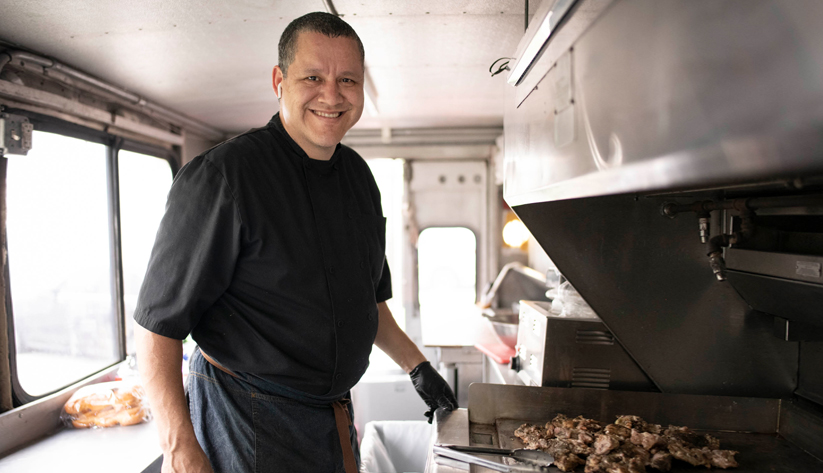
When the Latino CEO of a nonprofit theater in suburban Atlanta needed help accessing federal funding during the COVID-19 pandemic, he turned to his congresswoman. Legislation she sponsored was signed into law and solved a problem the CEO shared with operators of shuttered venues nationwide.
Anthony Rodriguez tells this story to showcase a situation where he, a Latino business leader, worked within the system to achieve results. "Not everyone in the Hispanic community has this sort of access. I was lucky," Rodriguez said of his outreach to US Representative Carolyn Bordeaux (D-Ga.) and the resolution she subsequently introduced to iron out differences between the Paycheck Protection Program and the Shuttered Venue Operators Grant.
Rodriguez notes that his range of professional relations beyond the Latino community is an outlier among his ethnic peers. The scope of these relations was affirmed in May, when business leaders of Atlanta's well-heeled Buckhead community selected him to oversee their major initiative: the $250 million fundraising effort and ensuing creation of the future civic heart of Buckhead, a planned nine-acre park intended to span highways and a transit station and connect to the regional trail system.
"Not everyone in the Hispanic community has this sort of access. I was lucky."
—Anthony Rodriguez, president and CEO, Aurora Theatre
Rodriguez's new role with the HUB404 park is a milestone in the arc of a Latino business culture that two recent studies by the Federal Reserve show tends to avoid contact with people outside the community for funding and professional services. During the height of COVID-19, many Latino business owners relied on resources within their community to survive pandemic-related shutdowns, and many of those who sought federal aid were rejected for reasons rooted in their business practices, according to Latino organizations that help businesses adapt to the business culture of the United States. Nonetheless, recent research shows that 50 percent of these business owners are optimistic about the future of their enterprises.
Fewer Latino firms sought pandemic aid
Latino-owned firms represented the lowest proportion among races and ethnicities to seek any type of financial assistance during the pandemic, including the Paycheck Protection Program and Small Business Economic Injury Disaster Loans, according to findings in "The Impact of the Pandemic on US Businesses: New Results from the Annual Business Survey," a March 2022 paper written by Brent Meyer of the Atlanta Fed and Mark Schweitzer of the Cleveland Fed. The application rate among Latinos of 69.5 percent slightly trailed that of Native Americans (70.5 percent), was significantly lower than the group with the highest proportion (Asians, at 76.6 percent), and was slightly less than the rate reported by White-owned businesses (71.5 percent).
In addition, Latino-owned firms that sought federal support didn't receive a warm reception in comparison to White-owned firms, according to the May 6 revision of the Small Business Credit Survey: 2022 Report on Employer Firms, a report produced by the 12 Federal Reserve Banks and led by a survey team that included Grace Guynn and Mary Hirt of the Atlanta Fed. The report showed that 36 percent of Latino-owned firms received a loan or line of credit in response to their request to the Small Business Administration, whereas for White-owned firms the approval rate was 46 percent. The study also addresses financial solvency: almost a third of respondents (31 percent) reported annual revenues of $100,000 to $500,000, and 14 percent reported annual revenues of $1 million or more.
Optimism persists despite challenges
Latino business owners still remain fairly bullish on their prospects for future success. Among Latino-owned firms, 50 percent reported that they expect business operations in 2022 to remain at or above 2021 levels, according to the Meyer and Schweitzer paper. This confidence level is near that of White-owned businesses (54 percent) and significantly higher than among Black-owned businesses (43 percent) and Asian-owned companies (44 percent). And the Fed’s Small Business Credit Survey report indicates that 83 percent of Latino firms expect to operate in 2022—the same rate reported by White-owned firms. In terms of revenue expectations over the next 12 months, the survey found that 63 percent of Latinos expected revenues to rise, a figure that trails Black owners (at 65 percent) and exceeds that of Native American owners (55 percent) and White owners (59 percent).
"Even though we feel we are going through difficult times as a country, immigrant drive and immigrant spirit of entrepreneurship will help us get out of the epidemic recession and past it."
—Augusto Sanabria, president and CEO, Prospera
The reason for the optimistic outlook is rooted in the confidence among Latinos in the strength of the US economic system and the opportunities it provides for success, according to Augusto Sanabria, a native of Argentina who serves as president and CEO of Prospera, an Orlando-based nonprofit that since 1991 has provided bilingual help to Latino entrepreneurs. Prospera's offices in Atlanta and Brookhaven are led by Anibal Torres, a longtime business and civic leader in metro Atlanta, and represent an expansion of Prospera's footprint in Florida and North Carolina.
"This is the land of opportunity, and this is one of the few countries, if not the only country, where if you work hard and do things the right way, time will reward you,” Sanabria said. “Even though we feel we are going through difficult times as a country, immigrant drive and immigrant spirit of entrepreneurship will help us get out of the epidemic recession and past it. A lot will have to do with Hispanic entrepreneurs leading the way."
Chef Oscar Mendivil is in the group Sanabria described. Mendivil now runs a catering business because "life had to continue, so we had to make different options so we can survive," he said. Mendivil is self-employed after a career centered in restaurants and hotel kitchens. That work dried up during the pandemic, and Mendivil determined that catering provided revenues more consistent and predictable than a food truck that relies on the shifting whims of passersby.
"I don't sell hand-to-hand because there is no guarantee," Mendivil said. "You may have to pay $1,000 to go into a festival and there may be 5,000 people. You get your inventory, but there’s no guarantee you’ll sell. And if you don’t sell, you lose money. That happened to me when I sold churros, pastry sticks with cinnamon and sugar. I made 1,000, sold 300, and 700 went into the trash. Or maybe I can sell sliders with french fries, or falafel and pita with one side, maybe a green salad or fries, for $13—but people won’t buy at that price. Catering is guaranteed. I try to give good prices to people and work it out with the customers."
Bearing the price of self-reliance
Sanabria observed, however, that such self-reliance and entrepreneurship zeal can carry a high cost. Responses to the Small Business Credit Survey reveal that 64 percent of Latino-owned businesses used personal funds to get through the pandemic crisis. More than a third, 37 percent, of Latino-owned firms reported they didn’t use a bank because “banks don’t work with businesses like mine,” which compares to a rate of 19 percent of White-owned businesses, according to the survey. Sanabria said the low rate of assistance seekers is a function not of the size or success of the business, but of the operator’s ability to adapt to the US culture’s reliance on credit and bankers, lawyers, and accountants.
"Latin America is a cash-driven economy. They come here and are used to operating in cash," Sanabria said. "The poor and uneducated, the well-educated and capitalized—they don't go to the bank. They're going to the next-door neighbor. The lack of understanding of how we do business in the US happens across the entire spectrum of the Hispanic market, from the low-income, low-education to high-income, high-education. This is why organizations like Prospera are putting a lot of emphasis on accounting and having financial records in order, among other vital business administration aspects."
Rodriguez tells a similar story, one with a happy ending, from his perspective in suburban Atlanta's burgeoning business of performing arts and venue development. Rodriguez, in addition to serving as cofounder and president and CEO of the Aurora Theatre, helped raise money to develop the $45 million Lawrenceville Arts Center. The Aurora operates the center and served as the private partner, with Lawrenceville as the public partner, to develop a destination attraction in downtown Lawrenceville. These insights in fundraising and placemaking contributed to Rodriguez’s selection to oversee the $250 million HUB404 park project.
"Are there Hispanic businesses that suffered because they didn't understand the system or have access to the system? Are there Hispanic businesses that closed because they couldn't figure out how to make cash flow work long enough to keep operations open? Yes," Rodriguez said. "There also are great stories of success. There's Jaime Ochoa, who opened D'Floridian, a Latino restaurant, mostly Cuban,...in Lawrenceville the middle of the pandemic. And it’s amazing—it's packed every single night."




